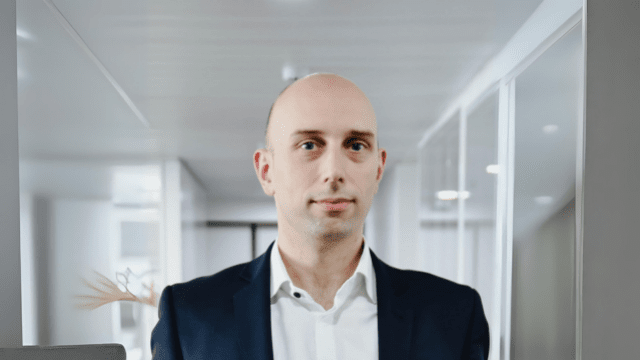Erwin Idoux, a Neuroscientist at McKinsey
After having accelerated the R&D of pharmaceutical laboratories for six years within the firm McKinsey & Company, Erwin Idoux (Class of 1999, Biology) joined in 2025 the Ellison Institute of Technology (EIT) in Oxford, an innovation center whose mission is to “translate scientific discoveries into real-world impact.”
Admitted at the same time to ENS Lyon and ENS Paris-Saclay, Erwin chose the latter out of a taste for biochemistry and molecular biology. He switched to neuroscience in his second-year Master’s, then embarked on a doctoral thesis on gaze stabilization — a specialized topic at the interface between biology, physics, and mathematics. “Your eyes are very slow detectors: seeing requires that the image remains stable on the retina long enough. My objective was to understand the properties of the neurons responsible for gaze stabilization during head movements, which, for example, allow you to read on the bus,” explains Erwin Idoux. He defended his thesis at Pierre and Marie Curie University in 2007, then carried out two postdocs — the first at Boston University, where he developed a nonlinear optical tool that controls intracellular calcium concentration in real time; the second at the French National Centre for Space Studies (CNES), on space sickness, from which astronauts suffer.
Research, consulting — same approach?
Tired of the slowness of the French research system, Erwin decided to turn toward consulting, a transition that more and more PhDs are now making in many countries. “Consulting and research share the same reductionist approach to problems. In both cases, you face complex problems that you break down into simpler sub-problems to solve independently. Then you re-synthesize the answer to the complex problem from each of the resolved sub-problems.” The objects differ, as does the timeframe. “In consulting, instead of three years, you have three weeks to solve the problem. You must also be able to be assertive quickly — to propose plausible solutions once you’ve understood the problem 80%, instead of waiting to understand it 99.99%, as is the case in research.”
Accelerating pharmaceutical R&D through AI
Erwin therefore took his first steps in consulting at Cepton, before joining four years later McKinsey’s Life Sciences practice. “We provided researchers in the pharmaceutical industry with algorithms and methods that enable them to accelerate their work without any loss of quality — or even to explore territories that had until now been inaccessible.” The proposed solutions were directly inspired by the latest advances in research. Beyond a solid knowledge base, ENS Paris-Saclay had in fact taught the consultant the ability to quickly find information and make it intelligible to his interlocutors.
Heading to Oxford, at the Ellison Institute of Technology
In the spring of 2025, Erwin Idoux left McKinsey to join the Ellison Institute of Technology (EIT) in Oxford. Founded and funded by Larry Ellison, this innovation center pursues an ideal: to provide scientifically and economically sustainable solutions to four major global challenges — health, food security, clean energy, and artificial intelligence & robotics. “The Institute’s goal is to create self-financing solutions so that as many people as possible can benefit in the long term from advances in science and artificial intelligence,” explains Erwin. The normalien, approached via LinkedIn, became Product Lead within the Artificial Intelligence and Robotics department. Attracted by the idea of “maximizing the social impact of research,” he works, among other things, on antimicrobial resistance. “The idea is to be able to detect and characterize pathogens very early on to prevent their global spread and the increase of their resistance to current treatments.” For its various projects, the EIT has established a strategic partnership with the University of Oxford, while developing an international network of academic and industrial collaborations. The Institute is also recruiting talents worldwide for its programs and applied research initiatives, including through a doctoral program.
In search of direct impact for humanity
Although Erwin appreciated his consulting work at McKinsey, he nevertheless missed being able to see the real impact of the strategies recommended to his clients. “Today, with the EIT teams, I can follow the process from start to finish — from identifying the problem to designing the solution, from creating the AI models to their practical implementation — and this, for major global challenges. This new position synthesizes my career as a researcher and my career as a consultant,” he concludes. A subtle balance that suits the normalien spirit particularly well!

Comments0
Please log in to see or add a comment
Suggested Articles



